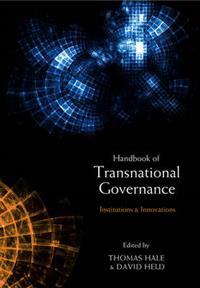
endast ny
Handbook of Transnational Governance: New Institutions and Innovations Upplaga 1
When we speak of global governance today, we no longer mean simply state-to-state diplomacy, international treaties, or intergovernmental organizations like the United Nations. Alongside these 'traditional' elements of global politics are a host of new institutions ranging from global networks of governmental officials, to private codes of conduct for corporations, to action-oriented partnerships of NGOs, governments, corporations, and other actors. These innovative mechanisms offer intriguing solutions to pressing transnational challenges as diverse as climate change, financial governance, workers' rights, and public health. But they also raise new questions about the effectiveness and legitimacy of transnational governance. An expanding body of scholarship has sought to identify and assess these new forms of governance, but this young body of work has lacked a sense of the larger picture. This volume seeks to fill that need by presenting a comprehensive overview of new forms of transnational governance. This resource is essential for those who want to explain why transborder governance has changed and to understand what implications these changes have for global politics.
Upplaga: 1a upplagan
Utgiven: 2011
ISBN: 9780745650616
Förlag: John Wiley & Sons
Format: Häftad
Språk: Engelska
Sidor: 296 st
When we speak of global governance today, we no longer mean simply state-to-state diplomacy, international treaties, or intergovernmental organizations like the United Nations. Alongside these 'traditional' elements of global politics are a host of new institutions ranging from global networks of governmental officials, to private codes of conduct for corporations, to action-oriented partnerships of NGOs, governments, corporations, and other actors. These innovative mechanisms offer intriguing solutions to pressing transnational challenges as diverse as climate change, financial governance, workers' rights, and public health. But they also raise new questions about the effectiveness and legitimacy of transnational governance. An expanding body of scholarship has sought to identify and assess these new forms of governance, but this young body of work has lacked a sense of the larger picture. This volume seeks to fill that need by presenting a comprehensive overview of new forms of transnational governance. This resource is essential for those who want to explain why transborder governance has changed and to understand what implications these changes have for global politics.
Ny bok
291 kr306 kr
5% studentrabatt med Studentapan
Begagnad bok (0 st)
Varje vecka tillkommer tusentals nya säljare. Bevaka boken så får du meddelande när den finns tillgänglig igen.



